{{ post.title }}
{{ post.excerpt }}
Read full storyOften, when students learn comparatives adjectives, many lesson plans focus almost exclusively on the comparative adjective + than construction. It’s certainly a widespread use, however it’s not the only one used in everyday speech.
We’ve put together a series of five comparative adjectives lesson plans that will enable your student to make comparatives of equality, such as ‘he’s as busy as a bee’, as well as ‘he’s not as smart as he thinks’. We cover the slightly tricky topic of using object or subject pronouns after than¸ though we know it will always grate on the ears of some teachers to hear ‘she is less intelligent than me.’
We also decided to introduce forms that can be used easily once the student can form the comparative adjective. It becomes easier and easier to use. In our opinion, the sooner the student can learn these uses, the more natural their English. And we make some time to introduce and practice modifiers such as almost, nearly, quite, much, a lot, far, a little, etc., to help students make their spoken English a little bit more varied.
You can find our five comparative adjectives lesson plans under the Adjectives&Adverbs section of our Teacher tab. If you don’t yet have an account for our private beta, sign up on our Home page.
Here’s a sample of what you can expect to find in our comparative adjectives lesson plan series:
A3.1 – Adjectives-Comparatives – 1
In the first lesson in our comparative adjectives lesson plan series we introduce the regular construction of comparatives from their base adjectives (+ -er) and include some spelling changes for some adjectives (e.g. doubling the consonant of adjectives such as big/bigger and for adding -ier for adjectives ending in -y such as friendly/friendlier). We also introduce the construction of comparatives for adjectives that are two or more syllables (e.g. careful/more careful). We finalize the lesson by introducing the three most common irregular comparatives: good/better, bad/worse, far/further.
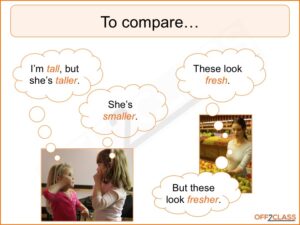
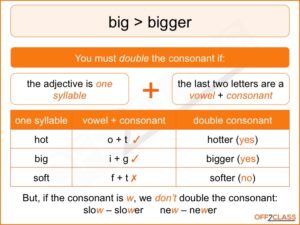
A3.2 – Adjectives-Comparatives – 2
In the second lesson in our comparative adjectives lesson plan series we introduce and practice the structure of comparative adjective + than + object pronoun (e.g. she is taller than him) and comparative adjective + than + subject pronoun + verb (e.g. she is taller than he is):
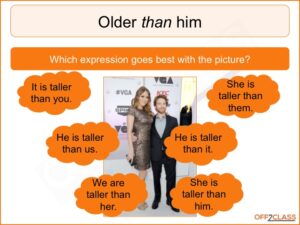

A3.3 – Adjectives-Comparatives – 3
In the third lesson in our comparative adjectives lesson plan series, we introduce and practice the structure of as + base adjective + as to show comparisons of equality (e.g. this house is as large as the other house):
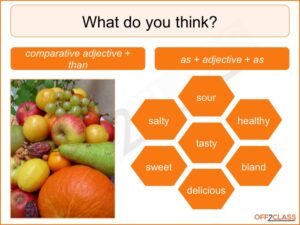
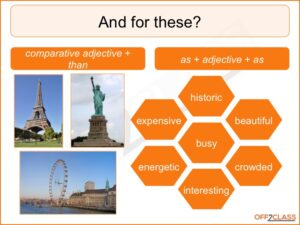
A3.4 – Adjectives-Comparatives – 4
In the fourth lesson in our comparative adjectives series we introduce several additional constructions to express comparisons. We introduce as + adjective + as + noun for everyday expressions (e.g. as busy as a bee). We introduce the use of modifiers (such as just, nearly, almost) + as + adjective + as (e.g. Movie are just as important as books).
A3.5 – Adjectives-Comparatives – 5
In the final lesson in our comparative adjectives lesson plan series we introduce the structure of repeating comparatives (e.g. it grew bigger and bigger). We also introduce more modifiers to make comparisons (a lot, a bit, far) and provide ample practice for all of our comparatives structures:
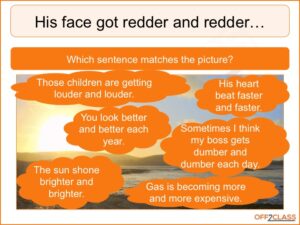
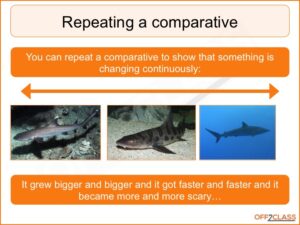
4 Comments
Emma says:
February 23, 2022 at 3:49 pm
This lesson will be useful for me
Regan says:
February 23, 2022 at 5:44 pm
That’s amazing to hear Emma!
Dreamy says:
October 25, 2023 at 2:41 pm
I tried the third lesson plan. It’s really helpful. Thank you very much.
Christine Chan says:
October 26, 2023 at 2:46 pm
You’re very welcome. We’re so glad you’re enjoying the lesson plans!